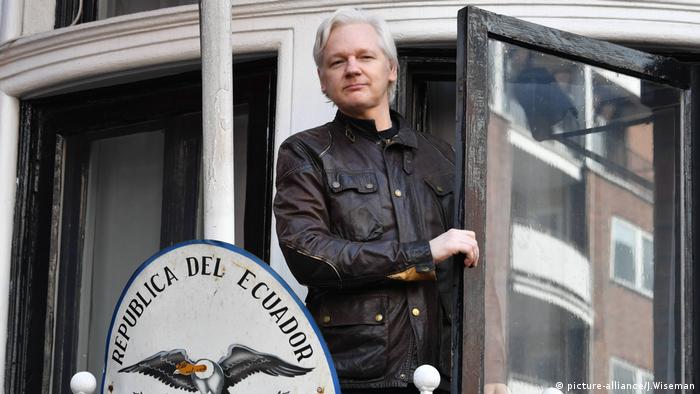Ecuador close to evicting Wikileaks founder Julian Assange: Greenwald
Ecuadorian authorities are about to expel Wikileaks founder Julian Assange from their London embassy, investigative journalist Glenn Greenwald reported. Assange was granted asylum in 2012 to avoid extradition to the US.
Assange has staged occasional public appearances from the balcony of the Ecuadorian embassy in London
The UK and Ecuador President Lenin Moreno are "close to finalizing" or have already finalized a deal to evict Julian Assange from the Ecuadorian embassy in London, according to an article published by The Intercept on Saturday.
According to reporter Glenn Greenwald, Ecuador could withdraw its protection to the Wikileaks founder in a matter of days. Greenwald first drew widespread public attention by publishing data provided by the NSA whistleblower Edward Snowden.
According to Greenwald's article, Ecuador's Moreno used the 2018 Global Disabilities Summit as a pretext to travel to London and discuss handing over Assange to British officials. Moreno has been critical of Assange, describing him as an "inherited problem," a "pebble in the shoe," who has created "more than a nuisance" for his government.
Wearing out his welcome
Assange first faced legal troubles shortly after his platform Wikileaks published several tranches of confidential US documents in 2010. In November that year, Sweden issued an international arrest warrant for the internet activist over allegations of rape and sexual assault. He was detained in London that December and put into house arrest, while continuing to fight his extradition to Sweden.
Assange repeatedly stated he was not opposed to facing the allegations in Sweden, but was afraid that Stockholm would deliver him to the US to be tried for publishing secrets, where he could face harsh prison sentences or even the death penalty.
After a UK judge ruled that Assange should be extradited to Sweden, the Australian-born activist sought refuge in the Ecuadorian embassy. Quito granted him asylum in 2012. However, ties between Assange and his Ecuadorian hosts gradually soured as his years-long stay irritated Western nations.
Hunt: 'British police will have a warm welcome' for Assange
Sweden dropped the rape allegations case against Assange in 2017, saying there was "no possibility of arresting Assange in the foreseeable future," but the UK later upheld its own arrest warrant against Assange for breaching bail to seek refuge in the embassy.
If expelled from the Ecuadorian embassy in London, Assange will likely face the minor "failure to surrender" charge. However, it is possible that the UK prosecutors would argue his prolonged evasion of justice amounted to more serious contempt of court, which carries a prison term of up to two years. During that time, he would likely need to fend off Washington's demands to be extradited to the US.
Earlier this week, British Foreign Secretary Jeremy Hunt said Assange has "serious charges" laid against him, but added the UK was "a country of due process."
"At any time he wants to he is free to walk out onto the street (…) and the British police will have a warm welcome for him" Hunt said.
Embassy cuts Assange's internet
Quito officials gave Assange Ecuadorian citizenship earlier this year in a failed attempt to resolve the impasse. In March, the embassy cut Assange's internet access after he questioned Theresa May's claim that Russia was behind the Skripal poisoning.
His actions "put at risk the good relations that the country maintains with the United Kingdom, with the rest of the European Union states and other nations," the Ecuadorian diplomats said at the time.
DW RECOMMENDS
WWW LINKS
AUDIOS AND VIDEOS ON THE TOPIC
- Date 22.07.2018
- Author Darko Janjevic (with dpa)
- Related Subjects Julian Assange, Carl XVI Gustaf
- Keywords Julian Assange, Wikileaks, the UK, Ecuador embassy, Sweden, Glen Greenwald
- Feedback: Send us your feedback.
- Print Print this page
- Permalink https://p.dw.com/p/31tQ6

No comments:
Post a Comment
Note: Only a member of this blog may post a comment.